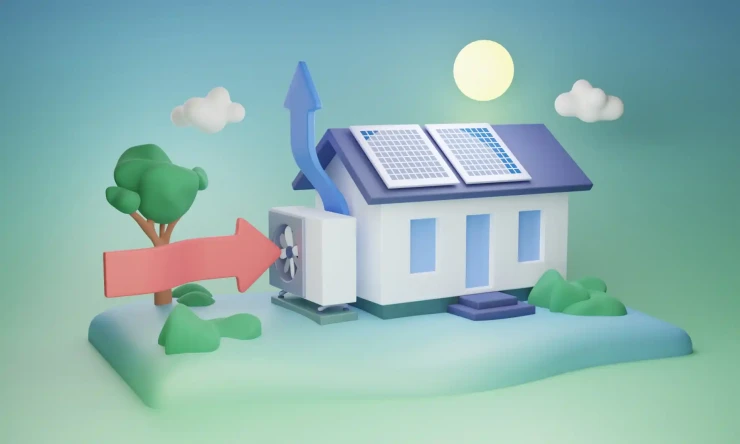The global energy landscape is shifting rapidly, with the demand for clean, reliable, and affordable energy sources surging to unprecedented levels. Countries worldwide are working to diversify their energy portfolios, integrating a variety of renewable technologies such as solar panels, wind turbines, and heat pumps. As the United Kingdom strives to achieve its ambitious net-zero emissions target by 2050, the role of nuclear power, particularly small modular reactors (SMRs), is gaining attention. This article will explore the value of SMRs alongside other renewable energy technologies and their potential benefits for the UK's energy future.
Small Modular Reactors: An Overview
Small modular reactors (SMRs) are a type of nuclear power plant that is smaller in size, output, and cost compared to traditional large-scale reactors. They typically generate between 10 and 300 megawatts (MW) of electricity, while traditional reactors produce 1000+ MW. SMRs are designed for modularity, meaning that they can be constructed and assembled offsite, then transported and installed at the desired location.
SMRs are based on a variety of designs, including light-water, heavy-water, gas-cooled, and even molten salt reactors. This diversity in design allows for flexibility in deployment, as different SMR types can be tailored to specific energy requirements or regional conditions. Furthermore, their small size and modularity make them well-suited for remote locations or areas with limited grid capacity.
Value for the UK: SMRs Complementing Other Renewable Technologies
Integrating with Solar and Wind Energy
The UK is actively working to increase its solar and wind energy capacity. However, these renewable energy sources are intermittent and depend on weather conditions, necessitating a stable backup power source. SMRs can fill this gap, providing reliable, low-carbon baseload power to complement solar and wind energy.
By integrating SMRs into the energy mix, the UK can ensure a consistent power supply, allowing for greater use of renewable energy sources without compromising grid stability. Furthermore, SMRs can be designed to adjust their output dynamically in response to fluctuations in renewable energy generation, contributing to a more resilient and flexible energy system.
Synergy with Heat Pumps
Heat pumps are an efficient technology for heating and cooling buildings, utilising ambient heat from the air, ground, or water sources. As the UK moves to decarbonise its heating sector, the deployment of heat pumps is expected to increase significantly. SMRs can play a crucial role in supporting this growth, as they can provide the electricity needed to power heat pumps, particularly during periods of peak demand.
Additionally, some SMR designs can generate both electricity and heat, offering a combined solution for district heating systems and industrial processes. This co-generation capability can increase the overall efficiency of the energy system and contribute to further emission reductions.
COMPARE PRICES FROM LOCAL INSTALLERS
Compare prices from local companies fast & free
Enter your postcode to compare quotes from leading professionals. We promise to keep your information Safe & Secure. Privacy Policy
Energy Security and Decarbonisation
Achieving net-zero emissions by 2050 requires the UK to transition away from fossil fuels and significantly expand its renewable energy capacity. SMRs, in conjunction with other renewable technologies, can help the UK meet its climate goals while ensuring energy security.
Their ability to produce continuous, baseload power makes SMRs a valuable addition to the UK's energy mix, as they can support the integration of intermittent renewable energy sources and enhance overall grid stability.
Cost and Financing
Constructing large-scale reactors comes with high upfront capital costs, presenting a significant challenge to the nuclear industry. However, SMRs offer a more cost-effective solution. By utilising factory-based manufacturing techniques and standardised designs, SMRs can be produced at a lower cost and with shorter construction times.
The modular nature of SMRs also allows for economies of multiples, meaning that the cost per unit of electricity decreases as more reactors are built. This makes SMRs an attractive investment for both public and private investors seeking to diversify their energy portfolios and support the expansion of renewable technologies like solar panels and heat pumps.
Job Creation and Economic Benefits
Investing in SMRs can generate significant economic benefits for the UK, particularly when considered alongside other renewable energy technologies. The development and deployment of SMRs will create demand for skilled labour in various sectors, such as manufacturing, construction, and operations. The UK has a long-standing history of expertise in the nuclear sector, and SMRs present an opportunity to capitalise on this legacy, potentially creating thousands of jobs in the process.
Moreover, the global market for SMRs is expected to grow rapidly in the coming years. By positioning itself as a leader in SMR technology, the UK can benefit from export opportunities, providing a boost to the domestic economy and solidifying its status as a key player in the global energy industry.
Scalability, Flexibility, and Supporting Remote Communities
The modularity of SMRs enables them to be scaled up or down, depending on energy demand and available resources. This makes them an ideal solution for the UK, where energy requirements can fluctuate significantly. SMRs can be deployed as stand-alone units or in clusters, providing flexibility in their application and allowing for the optimal allocation of resources.
The UK has numerous remote and island communities that face unique energy challenges. These areas often rely on costly and environmentally unfriendly diesel generators for power, as they are not connected to the national grid. SMRs offer a cleaner, more reliable energy solution for these communities. Their small size and modular design enable them to be deployed in remote locations, providing a stable, low-carbon energy source that can support local development, alongside other renewable technologies, and reduce reliance on fossil fuels.
SMR's the Conclusion
Small modular reactors have the potential to play a vital role in the UK's renewable energy mix, complementing technologies such as solar panels, wind turbines, and heat pumps. Their inherent advantages in cost, safety, and flexibility make them an attractive option for meeting the country's energy security and decarbonisation goals. Furthermore, the economic benefits, job creation potential, and support for remote communities make SMRs a strategic investment for the UK.
As the world moves toward a low-carbon future, the UK has the chance to lead the way in SMR technology and innovation, while simultaneously expanding its renewable energy capacity. By embracing this promising energy solution, the UK can secure its place at the forefront of the global energy transition and ensure a sustainable, prosperous future for generations to come.





























